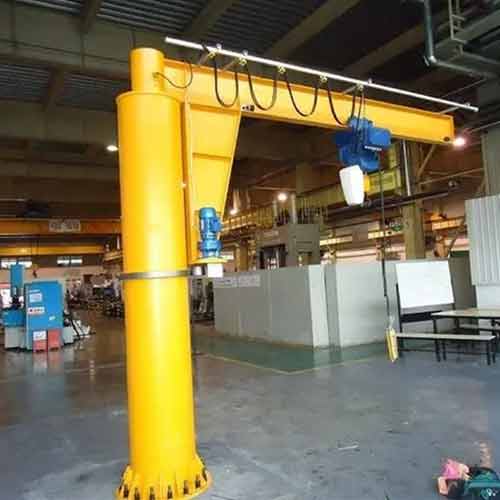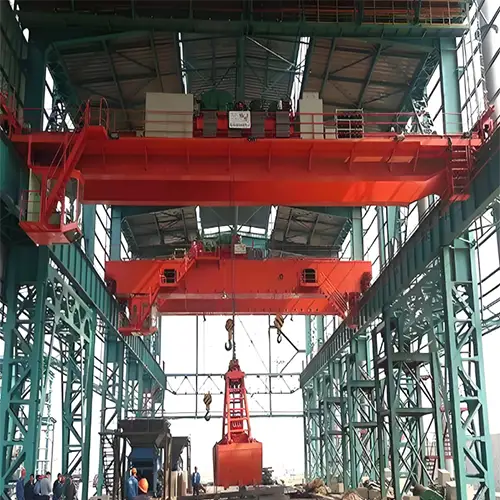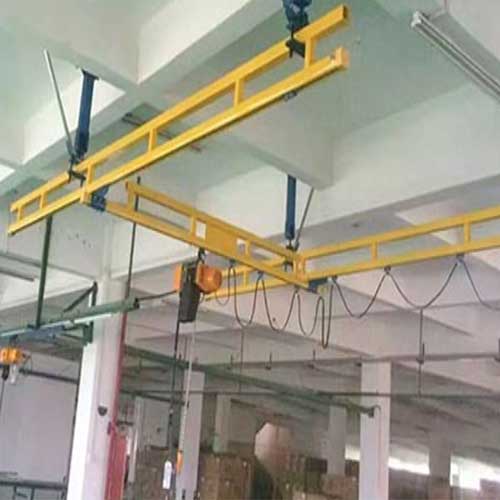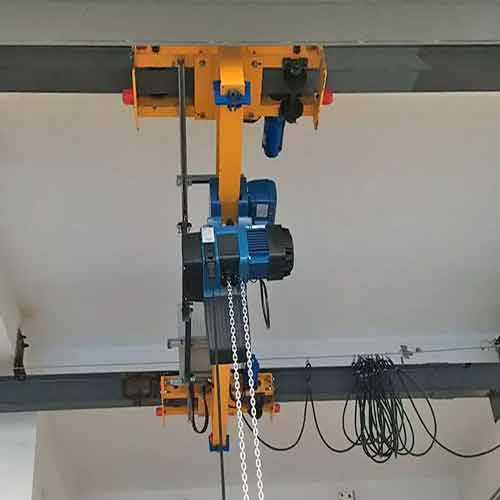Custom Jib Crane System for Sale, Hot Sale 5 Ton, 10 Ton, 16 Ton
Custom jib crane for your needs.All types of jib crane systems are available. Wall jib & floor jib hoist crane system for indoor & outdoor material handling.
| Crane type | Overhead jib crane system |
| Wall mounted jib | 500kg - 3 ton |
| Wall travelling crane | 500kg - 3 ton |
| Floor jib crane | 500kg -16 ton |
| Portable jib crane | 250kg -2 ton |
Category: Crane System
Your Trusted Overhead Jib Crane Manufacturer & Supplier
Custom Jib Crane System for Sale, Hot Sale 5 Ton, 10 Ton, 16 Ton
Wall Jib & Floor Jib Hoist Crane System for Indoor & Outdoor Material Handling
Custom jib crane for your needs.All types of jib crane systems are available. Wall jib & floor jib hoist crane system for indoor & outdoor material handling.
Mastering Jib Crane Systems: Your Complete Guide
Welcome to the world of Jib Crane Systems, where power, versatility, and efficiency converge to transform material handling operations. In this comprehensive guide, we will unravel the secrets of Jib Crane Systems, exploring their fundamentals and the myriad benefits they offer to a wide range of industries. Whether you are a seasoned crane operator or someone considering the adoption of Jib Crane Systems for your business, this guide is your key to mastering the art of Jib Crane System operation and selection.
Our journey begins with a foundational understanding of Jib Crane Systems. At their core, Jib Crane Systems are a type of crane with a horizontal boom, or jib, that supports a movable hoist. This ingenious design allows for a wide range of motion and precision in lifting and moving heavy loads. Jib Crane Systems come in various types, each tailored to specific tasks and industries.
So, why should you consider Jib Crane Systems as your lifting solution of choice? The advantages are abundant and diverse. Jib Crane Systems are prized for their:
- Space Efficiency: Jib Crane Systems are known for their compact design, making them an excellent choice for facilities with limited space. They utilize vertical space effectively, allowing for seamless material handling without crowding the floor.
- Ergonomic Handling: The ergonomic design of Jib Crane Systems promotes operator comfort and safety. Precise load control and minimal physical effort make them a preferred choice for repetitive lifting tasks.
- Versatility: Jib Crane Systems adapt to a multitude of industries and tasks. From manufacturing and warehousing to construction and agriculture, their versatility knows no bounds.
- Cost-Efficiency: Investing in a Jib Crane System can lead to significant cost savings. They enhance productivity and reduce labor requirements, ultimately boosting your bottom line.
Now that we've unlocked the potential of Jib Crane Systems and identified their advantages, it's time to dive deeper into the various types of Jib Crane Systems, each with its unique features and benefits. Join us on this journey of exploration and discovery as we master the art of Jib Crane Systems.
Types of Jib Crane Systems
As we embark on our journey to master Jib Crane Systems, it's essential to familiarize ourselves with the diverse range of Jib Crane Systems available. Each type comes with its own set of features and benefits, making them suitable for specific applications. Let's delve into the world of Jib Crane Systems and discover their unique characteristics.
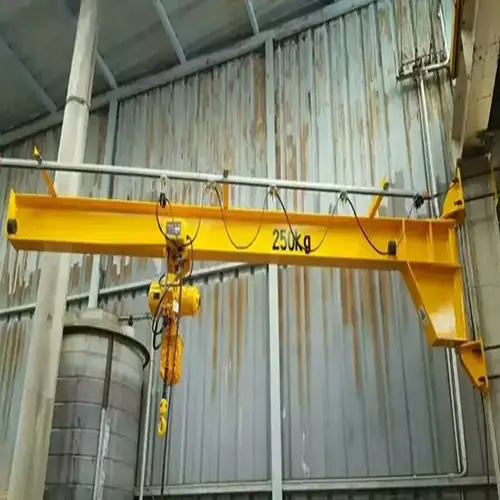
Wall-Mounted Jib Crane Systems
Unveiling the Wall-Mounted Jib Crane System
Wall-mounted Jib Crane Systems are the epitome of efficiency and space utilization. They are securely fastened to a wall or existing structure, providing exceptional support for material handling tasks. Key features include:
- Space Optimization: Wall-mounted Jib Crane Systems make the most of vertical space, leaving the floor uncluttered for other activities.
- Sleek Design: Their sleek, unobtrusive design ensures they seamlessly integrate into various workplace environments.
- 180-Degree Rotation: Wall-mounted Jib Crane Systems offer a full 180-degree rotation, providing maximum coverage.
Typical applications for wall-mounted Jib Crane Systems include manufacturing facilities, workshops, and any space where optimizing floor space is crucial.
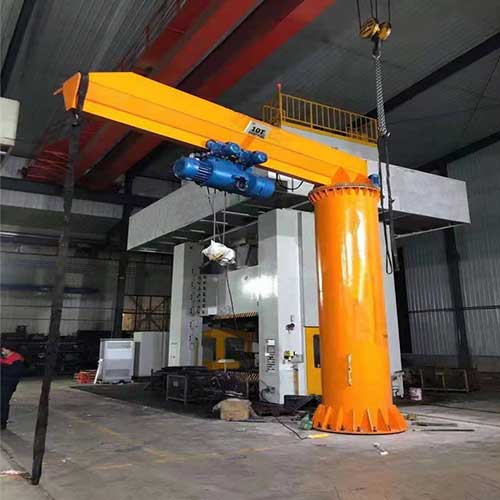
Exploring the Versatility of Freestanding Jib Crane Systems
Freestanding Jib Crane Systems are renowned for their adaptability and versatility. These cranes stand on their own support structure and can be placed anywhere on the factory or shop floor. Their standout features include:
- No Building Attachment Required: Freestanding Jib Crane Systems are self-supporting and don't need to be affixed to a building or structure.
- Easy Installation: Their simplicity in setup and installation makes them a convenient choice for various applications.
- Customizable Height: Freestanding Jib Crane Systems offer adjustable heights to suit specific lifting requirements.
Typical applications for freestanding Jib Crane Systems span a wide spectrum, from manufacturing and construction to warehousing and logistics.
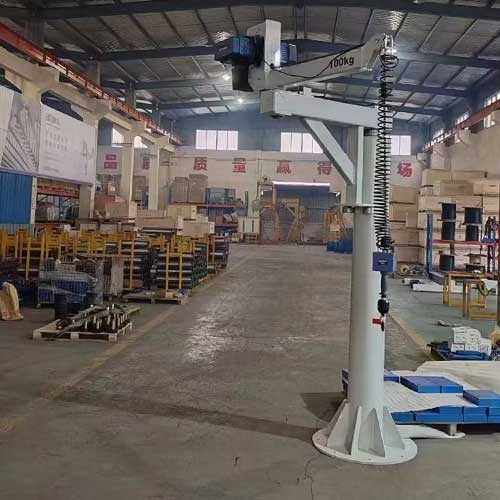
Articulating Jib Crane Systems
Articulating Jib Crane Systems, also known as knuckle boom cranes, are prized for their exceptional reach and precision. These cranes boast a design that allows for articulation, offering a wide range of motion and versatility. Notable features include:
- Exceptional Reach: Articulating Jib Crane Systems can reach around obstacles and access hard-to-reach areas with ease.
- Precise Load Control: Their articulating arm provides precision in load handling and placement.
- Flexibility: Articulating Jib Crane Systems are perfect for tasks that require finesse and reach.
Articulating Jib Crane Systems find their home in environments where precise material handling is essential, such as laboratories, assembly lines, and machining centers.
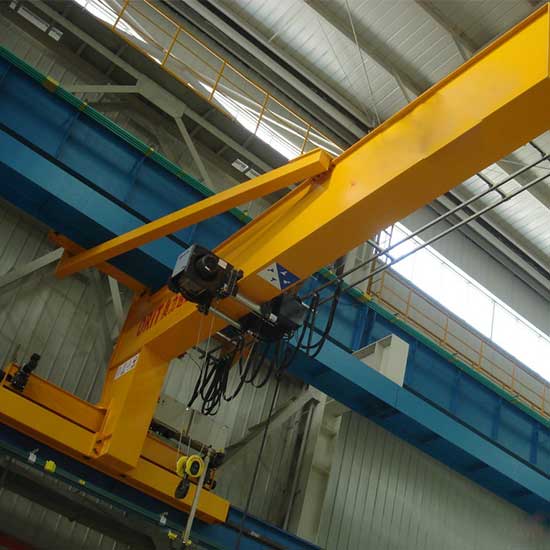
Convenience of Wall Travelling Jib Crane Systems
Wall traveling Jib Crane Systems, a type of wall cranes, are the epitome of efficiency for linked workshops or under overhead crane systems. They are designed to travel along the wall-mounted tracks, offering unparalleled convenience. Key features include:
- Space Optimization: Wall traveling Jib Crane Systems efficiently cover a large workspace without cluttering the floor.
- Easy Maneuverability: Their ability to move along the wall track makes them highly maneuverable and adaptable.
- Linking Workstations: Wall traveling Jib Crane Systems are ideal for connecting multiple workstations in a seamless workflow.
These cranes are the go-to choice for workshops where multiple tasks need to be carried out efficiently, such as in the automotive industry.
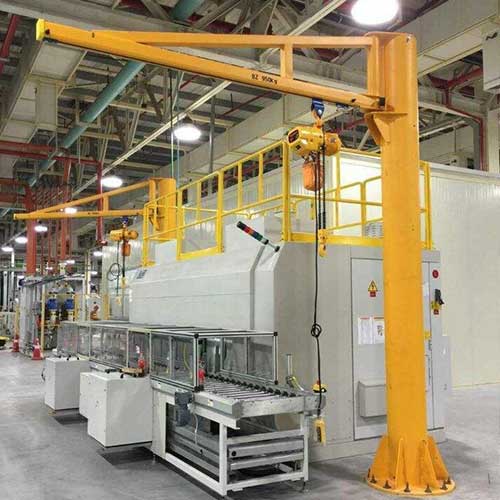
Floor-Mounted Jib Crane System
Ease and Economy of Floor-Mounted Jib Crane System for Workstation Applications
Floor-mounted Jib Crane Systems are a beacon of simplicity and economy. They stand on the shop floor and are suitable for workstation applications where loads need to be handled efficiently. Key features include:
- Easy Installation: Floor-mounted Jib Crane Systems are easy to install, requiring no complex structural changes.
- Cost-Effective: They provide a cost-effective solution for lifting and moving loads in specific work areas.
- Adaptability: Floor-mounted Jib Crane Systems can be easily relocated to adapt to changing workstation needs.
These cranes are ideal for smaller manufacturing or assembly workstations, where a cost-effective lifting solution is paramount.
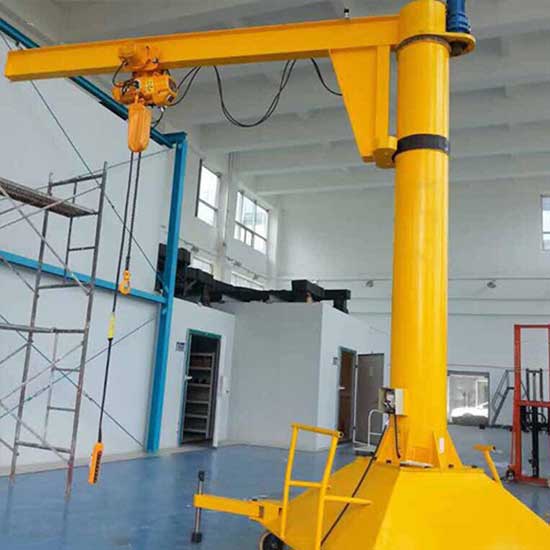
Flexibility of Portable Jib Crane Systems for Light Loads Handling
Portable Jib Crane Systems offer exceptional flexibility when it comes to handling loads, especially those not exceeding 2 tons. These cranes are easy to transport and maneuver, making them a go-to choice for various applications. Key features include:
- Lightweight and Portable: Portable Jib Crane Systems are easy to move to different work areas.
- Quick Setup: Their setup is straightforward and does not require permanent installation.
- Light Load Handling: They excel in handling lighter loads with precision.
These cranes are well-suited for tasks that involve light loads, frequent changes in workspace, or applications with limited space.
As we explore these various types of Jib Crane Systems, it's important to note that choosing the right one for your specific application is paramount. Each type offers distinct advantages, and understanding these differences will guide you toward the most suitable solution for your lifting needs. Whether it's optimizing space, enhancing precision, or streamlining workflow, there's a Jib Crane System type perfectly tailored to meet your requirements. Join us as we continue our journey through the world of Jib Crane Systems, unveiling their features, benefits, and typical applications.
Features and Benefits of Jib Crane System System
In our quest to master the world of Jib Crane Systems, understanding their features and benefits is crucial. Jib Crane Systems offer a plethora of advantages that make them an exceptional choice for lifting and material handling across diverse industries. Let's unravel these features and benefits that set Jib Crane Systems apart.
Streamlined Design -Efficient Use of Space
One of the standout features of Jib Crane Systems is their streamlined design. These cranes are engineered for efficiency, making the most of the available space. They are particularly well-suited for environments with limited room to spare. By utilizing vertical space effectively, Jib Crane Systems leave the floor uncluttered for other essential activities. This design ensures that every inch of your workspace is used to its full potential.
Ergonomic Handling -Prioritizing Operator Comfort
Jib Crane Systems prioritize operator comfort and safety. Their design allows for ergonomic load handling, reducing the physical strain on workers. Operators can control loads with precision, minimizing the risk of accidents or injuries. This ergonomic approach not only enhances the well-being of your workforce but also boosts productivity and operational efficiency.
Versatile Applications Adaptability Across Industries
Jib Crane Systems are incredibly versatile, adapting to a wide array of industries and tasks. Whether you're in manufacturing, construction, warehousing, or agriculture, there's a Jib Crane System suitable for your needs. Their adaptability extends to a variety of materials, from heavy machinery to fragile components. This versatility ensures that Jib Crane Systems remain a reliable solution for an extensive range of applications.
Cost-Efficiency -Savings and Efficiency
Investing in a Jib Crane System system can lead to significant cost savings. Their space-saving design reduces the need for extensive structural modifications, keeping installation costs in check. Furthermore, their efficiency in material handling minimizes labor requirements and maximizes productivity. Jib Crane Systems are a cost-effective solution that can positively impact your bottom line.
As we continue our journey through this guide, we'll explore how these features and benefits translate into real-world applications. Whether it's streamlining manufacturing processes, optimizing warehouse logistics, enhancing construction operations, or boosting agricultural productivity, Jib Crane Systems prove to be invaluable tools in a variety of scenarios. Join us as we uncover the typical applications where Jib Crane Systems shine, providing practical solutions to material handling challenges.
Comparison of Jib Crane System System vs Gantry Crane System vs Bridge Crane System
In our exploration of crane systems, it's essential to understand the key differences and advantages of various types. Let's take a closer look at the comparison of Jib Crane Systems, Gantry Crane Systems, and Bridge Crane Systems to help you make informed decisions for your material handling needs.
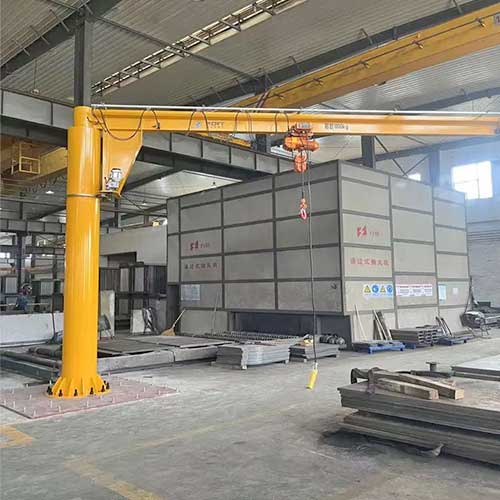
Advantages:
- Space Efficiency: Jib Crane Systems have a compact design and utilize vertical space effectively. They are ideal for facilities with limited floor space.
- Ergonomic Handling: These cranes prioritize operator comfort and safety, offering precise load control and minimizing physical strain.
- Versatility: Jib Crane Systems adapt to various industries and tasks, making them suitable for manufacturing, construction, warehousing, and agriculture.
- Cost-Efficiency: Jib Crane Systems offer cost savings through their efficient design and reduced labor requirements.
Disadvantages:
- Limited Coverage: Jib Crane Systems have a limited working radius compared to larger crane systems.
- Load Capacity: Their load capacity is generally lower than that of gantry and bridge cranes.
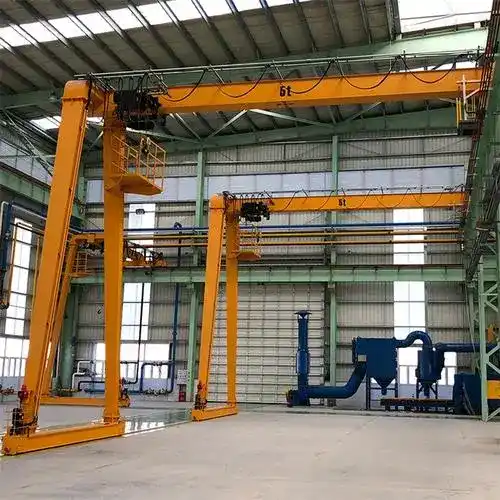
Advantages:
- High Load Capacity: Gantry cranes excel in lifting heavy loads, making them suitable for industrial and construction applications.
- Versatility: These cranes adapt to various industries and tasks, including ports, manufacturing, and construction.
- Portability: Some gantry cranes are designed for portability, allowing them to be moved to different work areas.
- Span Coverage: Gantry cranes offer a broader span coverage compared to Jib Crane Systems.
Disadvantages:
- Space Requirements: Gantry cranes require significant floor space, which may not be suitable for facilities with limited room.
- Complex Installation: The installation of gantry cranes is more complex and may involve additional structural work.
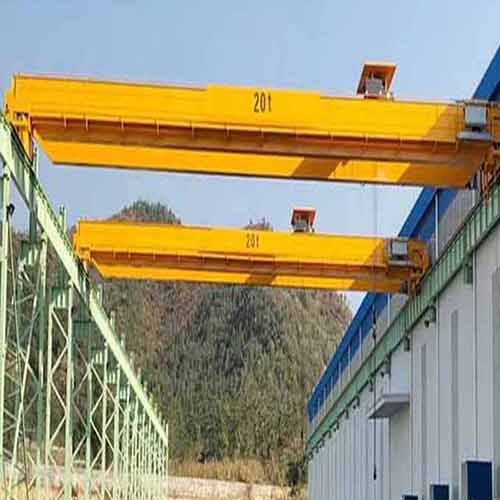
Advantages:
- High Load Capacity: Bridge cranes are capable of handling very heavy loads, making them ideal for large manufacturing and industrial facilities.
- Extensive Coverage: These cranes can cover a wide working area, providing efficient material handling throughout the facility.
- High Efficiency: Bridge cranes are known for their high operational efficiency, particularly in large-scale operations.
Disadvantages:
- Complex Installation: Installing bridge cranes can be a significant undertaking, often involving structural changes to the building.
- Space Requirements: They require ample overhead space, limiting their suitability for facilities with low ceilings.
In summary, the choice between Jib Crane System, Gantry Crane, and Bridge Crane systems depends on your specific material handling needs, available space, and budget. Jib Crane Systems are excellent for smaller spaces and ergonomic handling, while Gantry and Bridge cranes are better suited for heavy lifting and extensive coverage. Carefully consider the advantages and disadvantages of each system to determine the best fit for your operations.
Typical Applications of Jib Crane Systems
Jib Crane Systems are not one-size-fits-all tools; they are versatile and adaptable, finding their place in a variety of industries and applications. Let's explore the typical scenarios where Jib Crane Systems shine, providing practical solutions to material handling challenges.
Manufacturing Excellence -Elevating Manufacturing Operations
In the realm of manufacturing, where efficiency and precision are paramount, Jib Crane Systems play a pivotal role. They streamline material handling processes, allowing for the swift and precise movement of components and products. Jib Crane Systems enable operators to position heavy machinery or components with ease, reducing the risk of errors and workplace injuries. This level of control and accuracy results in enhanced manufacturing excellence and improved productivity.
Warehousing Solutions -Optimizing Warehouse Logistics
In the bustling world of warehousing and logistics, Jib Crane Systems are invaluable assets. Their compact design makes them ideal for tight spaces within warehouses. Jib Crane Systems efficiently handle the loading and unloading of goods, whether onto shelves or onto trucks for shipping. By optimizing warehouse logistics, Jib Crane Systems contribute to smoother and more efficient operations, reducing downtimes and ensuring timely deliveries.
Construction Versatility -Supporting Construction Projects with Ease
Construction sites are dynamic environments with a constant need for lifting heavy materials and equipment. Jib Crane Systems rise to the occasion, offering flexibility and adaptability. They can be positioned at strategic points on the construction site to handle loads with precision and ease. Whether it's lifting steel beams, concrete blocks, or construction equipment, Jib Crane Systems are essential tools for enhancing construction versatility and productivity.
Agricultural Advantage -Enhancing Agricultural Processes and Minimizing Labor
In the agricultural sector, where the handling of heavy loads is a common task, Jib Crane Systems prove their worth. They efficiently assist in processes like loading and unloading agricultural produce, machinery maintenance, and equipment handling. By minimizing the physical strain on labor, Jib Crane Systems not only enhance productivity but also contribute to a safer and more comfortable working environment. This agricultural advantage is particularly critical in industries like farming and agribusiness.
As we delve into these typical applications, it becomes evident that Jib Crane Systems are versatile tools that offer a helping hand in a wide range of scenarios. Whether it's in manufacturing, warehousing, construction, or agriculture, these cranes elevate operations, boost efficiency, and enhance workplace safety. Join us as we continue to explore the world of Jib Crane Systems, shedding light on the top concerns of users and providing answers to ensure seamless material handling.
Top Concerns of Jib Crane System Users
In our journey to mastering the world of Jib Crane Systems, it's crucial to address the top concerns that users often grapple with. We understand that safety, maintenance, and load capacity are at the forefront of your considerations. Let's delve into these concerns and provide the insights you need for seamless material handling.
Safety First -Prioritizing Crane Safety
The safety of both your workforce and your material is paramount when using Jib Crane Systems. Jib Crane Systems are engineered with safety in mind. Their ergonomic design allows operators to handle loads with precision, reducing the risk of accidents or injuries. To further enhance safety, it's essential to provide proper training to crane operators and ensure they follow safety protocols diligently. Regular inspections and maintenance play a crucial role in identifying and addressing potential safety issues. When safety is a priority, Jib Crane Systems become not only efficient but also reliable allies in your operations.
Maintenance Matters -Ensuring Longevity Through Regular Maintenance
The longevity and performance of your Jib Crane System system depend on regular maintenance. Scheduled inspections, lubrication, and preventive measures are essential to keep your crane operating at its best. It's imperative to follow the manufacturer's maintenance guidelines to prevent unexpected breakdowns and costly repairs. A well-maintained Jib Crane System system is not only a reliable tool but also a long-term investment in your material handling operations.
Load Capacity Clarity -Understanding Load Capacity Considerations
Load capacity is a critical factor in ensuring the optimal performance of your Jib Crane System. Each Jib Crane System is designed to handle specific loads within defined parameters. Exceeding these limits can compromise both safety and the crane's functionality. To maintain load capacity clarity, always refer to the crane's load capacity chart provided by the manufacturer. It's essential to communicate load requirements clearly to operators and avoid overloading the crane. By adhering to load capacity guidelines, you can ensure safe and efficient material handling.
As we address these top concerns, it becomes evident that a well-maintained and properly operated Jib Crane System system is not only a reliable tool but also a safety-conscious one. The insights shared here serve as a guide to maximizing the benefits of Jib Crane Systems while minimizing potential challenges. Join us as we dive into the world of Jib Crane Systems further, exploring safety standards, troubleshooting, and advanced technologies in the realm of material handling.
Q&A on Jib Crane Systems
Navigating the world of Jib Crane Systems can be a rewarding journey when you have the right information at your fingertips. In this Q&A section, we address some common questions and provide expert guidance to help you make informed decisions and optimize your Jib Crane System system.
How to Choose the Right Jib Crane System?
Expert Guidance on Selecting the Perfect Jib Crane System for Your Needs
Choosing the right Jib Crane System is a critical decision that depends on several factors. First, assess your specific material handling needs, including the weight and dimensions of the loads you'll be handling. Consider the available workspace and the crane's required reach. Wall-mounted Jib Crane Systems are suitable for compact spaces, while freestanding Jib Crane Systems offer versatility. Articulating Jib Crane Systems provide precision and reach. Consulting with Jib Crane System experts or manufacturers can help you determine the ideal crane for your application.
What Safety Features Are Essential for Jib Crane Systems?
An Exploration of Crucial Safety Features
Safety is a paramount concern when it comes to Jib Crane Systems. Essential safety features include limit switches to prevent over-travel, emergency stop buttons for immediate halting of operations in case of emergencies, and warning signs to indicate the crane's operational zone. Regular maintenance and operator training are also essential for safety. Additionally, some Jib Crane Systems come with load limiters and sway control features to enhance safety during load handling.
How Can I Optimize Jib Crane System Space Usage?
Practical Tips for Maximizing Workspace Efficiency
Optimizing space usage with Jib Crane Systems begins with selecting the right type of Jib Crane System that fits your available space. Wall-mounted Jib Crane Systems are excellent for small spaces, while freestanding Jib Crane Systems offer flexibility in larger areas. Consider the crane's range and placement to ensure it covers the necessary workspace. Keep the area around the crane clear of obstructions, and implement organized storage solutions to maximize the use of your space.
As we conclude our comprehensive guide to Jib Crane Systems, we hope these questions and answers have shed light on some of the key considerations when working with these versatile material handling solutions. Jib Crane Systems are more than tools; they are allies in enhancing efficiency and safety in your operations. We encourage you to explore the world of Jib Crane Systems further and unlock their full potential for your material handling needs.
Related Products
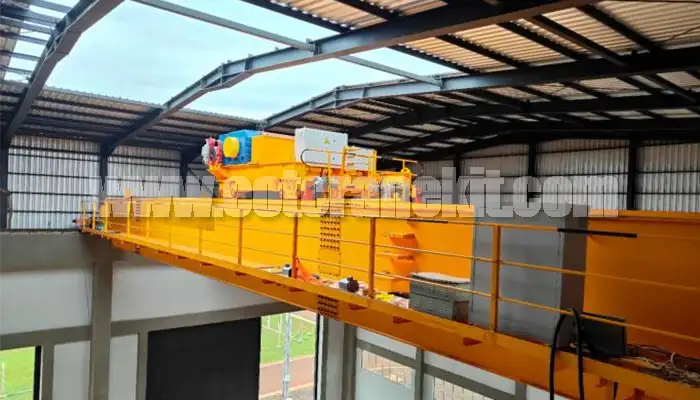
Latest project
150 Ton Overhead Crane Installation Feedback – Paraguay Case
QDX 150 ton overhead crane in action in Paraguay. Installation photos, video, and client feedback show performance, safety, and heavy-lifting efficiency.
Free consultation to Confirm Parameters & Specifications and Get
Latest Crane Price & Crane Rate.
- Types of overhead cranes : _______?
- Optional: Overhead travelling crane, goliath gantry crane,Slewing jib crane, Single girder or double girder crane,small portable crane or kbk crane, etc.
- Capacity of overhead crane: _______?
- Optional: 0.25ton, 0.5 ton, 1 ton, 2 ton, 3ton, 5 ton, 10 ton,15ton, 20ton, 25 ton, 30ton,35ton, up to 550ton, etc.
- Crane span & lifting height : _______?
- Crane travelling length : _____?
- Control of overhead crane:_______?
- Optional: pendant/ remote/cabin control
- Voltage supply of overhead crane:_____?
- Eg,: 380V50/60HZ,3Phase or others,etc.
- Application/usage of crane:_______?
- Eg,: Steel mill, ,injection mold, cement,stone, concrete,granite, general manufacturing, etc.
Just leave a message via the contact form and our hoist and crane engineer will contact you with in 24working hours.
Get In Touch
